Hyundai Tucson vs SEAT Leon SP Sportstourer - Differences and prices compared
Costs and Efficiency:
Price and efficiency are key factors when choosing a car – and this is often where the real differences emerge.
SEAT Leon SP Sportstourer has a to a small extent advantage in terms of price – it starts at 25800 £, while the Hyundai Tucson costs 30600 £. That’s a price difference of around 4800 £.
Fuel consumption also shows a difference: Hyundai Tucson manages with 1 L and is therefore slightly more efficient than the SEAT Leon SP Sportstourer with 1.20 L. The difference is about 0.20 L per 100 km.
As for range, the SEAT Leon SP Sportstourer performs significantly better – achieving up to 131 km, about 61 km more than the Hyundai Tucson.
Engine and Performance:
Under the bonnet, it becomes clear which model is tuned for sportiness and which one takes the lead when you hit the accelerator.
When it comes to engine power, the SEAT Leon SP Sportstourer has a hardly perceptible edge – offering 272 HP compared to 252 HP. That’s roughly 20 HP more horsepower.
In acceleration from 0 to 100 km/h, the is quicker – completing the sprint in , while the takes . That’s about faster.
In terms of top speed, the SEAT Leon SP Sportstourer performs minimal better – reaching 220 km/h, while the Hyundai Tucson tops out at 204 km/h. The difference is around 16 km/h.
There’s also a difference in torque: Hyundai Tucson pulls barely noticeable stronger with 379 Nm compared to 360 Nm. That’s about 19 Nm difference.
Space and Everyday Use:
Beyond pure performance, interior space and usability matter most in daily life. This is where you see which car is more practical and versatile.
Seats: offers more seating capacity – vs .
In curb weight, SEAT Leon SP Sportstourer is somewhat lighter – 1384 kg compared to 1542 kg. The difference is around 158 kg.
In terms of boot space, the offers more room – compared to . That’s a difference of about .
In maximum load capacity, the Hyundai Tucson performs slightly better – up to 1799 L, which is about 199 L more than the SEAT Leon SP Sportstourer.
When it comes to payload, SEAT Leon SP Sportstourer hardly perceptible takes the win – 569 kg compared to 545 kg. That’s a difference of about 24 kg.
Who comes out on top?
Overall, the SEAT Leon SP Sportstourer shows itself to be offers a more balanced package and secures the title of DriveDuel Champion.
It convinces with the more balanced overall package and proves to be the more versatile choice for everyday use.
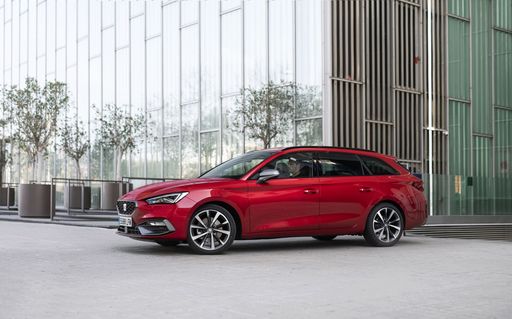 @ SEAT S.A. / SEAT Media Center
@ SEAT S.A. / SEAT Media Center
SEAT Leon SP Sportstourer
Costs and Consumption
View detailed analysis
Engine and Performance
View detailed analysis
Dimensions and Body
View detailed analysis
Hyundai Tucson
Hyundai Tucson marries bold, sculpted looks with a clever, roomy cabin that feels smarter than its price tag suggests. It's composed on the road, easy to live with day-to-day, and a sensible choice for buyers who want SUV style without the showroom theatrics.
details @ Hyundai Motor Company
@ Hyundai Motor Company
 @ Hyundai Motor Company
@ Hyundai Motor Company
 @ Hyundai Motor Company
@ Hyundai Motor Company
 @ Hyundai Motor Company
@ Hyundai Motor Company
 @ Hyundai Motor Company
@ Hyundai Motor Company
SEAT Leon SP Sportstourer
The SEAT Leon Sportstourer blends sporty hatchback looks with estate practicality, giving buyers a sleek wagon that doesn't look like it's trying too hard to be sensible. Its cabin feels modern and well thought‑out, with clever storage and a driving character that keeps the journey entertaining — a smart choice for families who don't want to surrender style for space.
details @ SEAT S.A. / SEAT Media Center
@ SEAT S.A. / SEAT Media Center
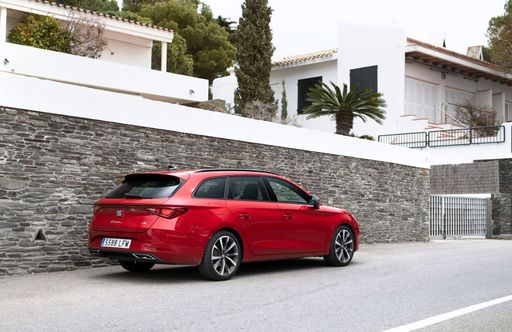 @ SEAT S.A. / SEAT Media Center
@ SEAT S.A. / SEAT Media Center
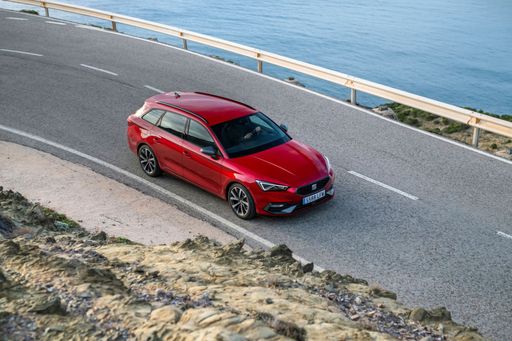 @ SEAT S.A. / SEAT Media Center
@ SEAT S.A. / SEAT Media Center
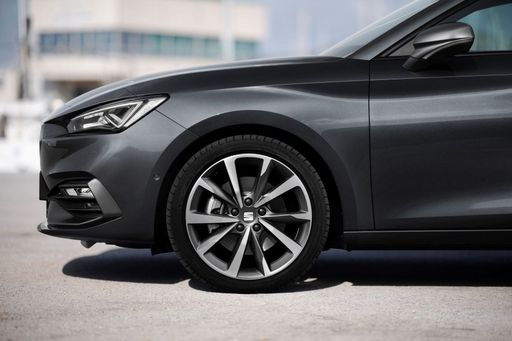 @ SEAT S.A. / SEAT Media Center
@ SEAT S.A. / SEAT Media Center
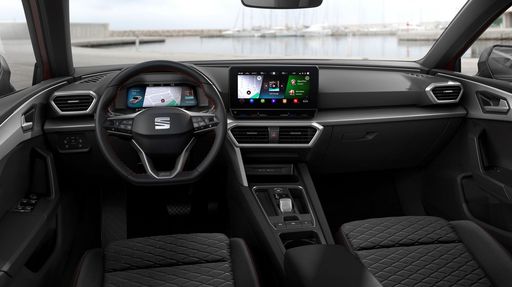 @ SEAT S.A. / SEAT Media Center
@ SEAT S.A. / SEAT Media Center
 @ Hyundai Motor Company
@ Hyundai Motor Company
|
 @ SEAT S.A. / SEAT Media Center
@ SEAT S.A. / SEAT Media Center
|
|
|
|
Costs and Consumption |
|
|---|---|
|
Price
30600 - 46300 £
|
Price
25800 - 37900 £
|
|
Consumption L/100km
1 - 7.6 L
|
Consumption L/100km
1.2 - 5.6 L
|
|
Consumption kWh/100km
-
|
Consumption kWh/100km
-
|
|
Electric Range
64 - 70 km
|
Electric Range
131 km
|
|
Battery Capacity
-
|
Battery Capacity
19.70 kWh
|
|
co2
22 - 172 g/km
|
co2
28 - 128 g/km
|
|
Fuel tank capacity
42 - 54 L
|
Fuel tank capacity
40 - 45 L
|
Dimensions and Body |
|
|---|---|
|
Body Type
SUV
|
Body Type
Estate
|
|
Seats
5
|
Seats
5
|
|
Doors
5
|
Doors
5
|
|
Curb weight
1542 - 1889 kg
|
Curb weight
1384 - 1708 kg
|
|
Trunk capacity
546 - 620 L
|
Trunk capacity
470 - 620 L
|
|
Length
4510 - 4535 mm
|
Length
4642 mm
|
|
Width
1865 mm
|
Width
1799 mm
|
|
Height
1650 mm
|
Height
1437 - 1456 mm
|
|
Max trunk capacity
1721 - 1799 L
|
Max trunk capacity
1450 - 1600 L
|
|
Payload
523 - 545 kg
|
Payload
422 - 569 kg
|
Engine and Performance |
|
|---|---|
|
Engine Type
Diesel MHEV, Plugin Hybrid, Petrol, Full Hybrid
|
Engine Type
Petrol, Petrol MHEV, Diesel, Plugin Hybrid
|
|
Transmission
Automatic, Manuel
|
Transmission
Manuel, Automatic
|
|
Transmission Detail
Dual-Clutch Automatic, Automatic Gearbox, Manual Gearbox
|
Transmission Detail
Manual Gearbox, Dual-Clutch Automatic
|
|
Drive Type
Front-Wheel Drive, All-Wheel Drive
|
Drive Type
Front-Wheel Drive
|
|
Power HP
136 - 252 HP
|
Power HP
115 - 272 HP
|
|
Acceleration 0-100km/h
7.9 - 11.6 s
|
Acceleration 0-100km/h
7.9 - 10.8 s
|
|
Max Speed
180 - 204 km/h
|
Max Speed
197 - 220 km/h
|
|
Torque
250 - 379 Nm
|
Torque
220 - 360 Nm
|
|
Number of Cylinders
4
|
Number of Cylinders
3 - 4
|
|
Power kW
100 - 185 kW
|
Power kW
85 - 200 kW
|
|
Engine capacity
1598 cm3
|
Engine capacity
1498 - 1968 cm3
|
General |
|
|---|---|
|
Model Year
2024 - 2025
|
Model Year
2024 - 2025
|
|
CO2 Efficiency Class
E, B, F, D
|
CO2 Efficiency Class
D, B
|
|
Brand
Hyundai
|
Brand
SEAT
|
What drive types are available for the Hyundai Tucson?
Available configurations include Front-Wheel Drive or All-Wheel Drive.
The prices and data displayed are estimates based on German list prices and may vary by country. This information is not legally binding.
